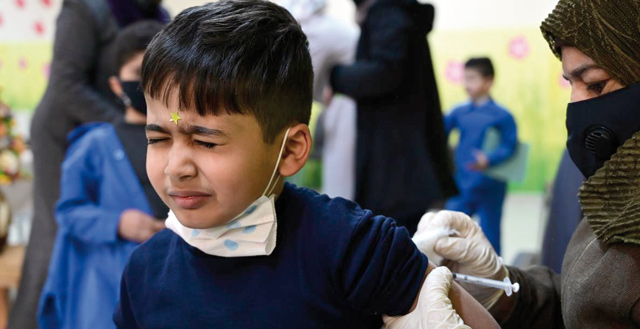AMMAN — The Ministry of Health has been constantly working to increase public awareness on the importance of routine vaccination for children and its distinction from the COVID-19 vaccines, according to an official.
In a recent statement, Ghazi Sharkas, assistant secretary-general for Primary Healthcare at the Ministry of Health, reaffirmed the importance of distinguishing between the National Immunisation Programme and the COVID-19 vaccines.
According to Sharkas, children should receive vaccinations offered by the national vaccination programme in health centres for children under the age of six, as well as in schools for students in first through 10th grades by the school health programme.
Sharkas went on to say that all children’s vaccines are available at the Ministry of Health, noting that some parents are showing reluctance towards vaccinating their children due to the current situation.
He noted that this can cause a serious problem, as steering away from routine vaccines can increase the risk of severe infectious diseases that can be prevented otherwise.
He stated that vaccination coverage rates must remain high in order to avoid the spread of any infectious diseases that have not been monitored, implying that the ministry does not provide COVID-19 vaccines to children under the age of 18.
“During the COVID-19 pandemic, routine vaccination continues to be very important. The pandemic has caused a decline in the number of children receiving routine immunisations, which could lead to an increase in illness and risk of death from preventable diseases,” he added.
UNICEF Jordan Representative Tanya Chapuisat said: “Routine vaccination is among the proven and most cost-effective public health measures to prevent diseases and save lives. They help prevent deadly and debilitating diseases such as diphtheria, tetanus, pertussis, influenza and measles.”
Over the last decades, Jordan has made remarkable progress in routine vaccination for children. The high coverage rate is reflected in the decrease in mortality and morbidity from vaccine preventable diseases over time, she told The Jordan Times.
“We support the government in routine vaccination through planning, community engagement and social mobiliastion campaigns. In addition, UNICEF facilitated outreach immunisation for vulnerable children living in hard to reach remote areas across the Kingdom through mobile vaccination units. UNICEF provided vaccine commodities such as syringes and safety boxes and strengthened the national vaccine cold chain,” Chapuisat noted.
She highlighted the importance of raising awareness of routine vaccination and fighting misinformation.
“Although vaccines are amongst the greatest advances of modern medicine, misinformation about their safety has been spreading, even more so against the COVID-19 vaccines. However, the truth is, vaccines have protected lifelong disabilities, and almost eliminated the scourge of diseases such as measles and polio, saved and continue saving millions of lives every year,” she said.
“Vaccinating children does not only protect them, but also other children through building herd immunity,” Chapuisat said.
She noted that the past year has provided “a shattering glimpse of life in a world ravaged by a deadly infectious disease. It has also served as a stark reminder of the power of vaccines to protect against it. Today, vaccines are the best hope we have of ending this pandemic and rebuilding our lives”.
